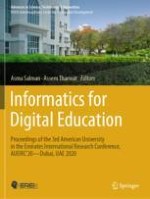This book, consisting of three separate parts, deliberates extensively on the effects of informatics and digital systems on modern education systems, tackling topics such as inclusivity for special needs students, context-based learning, the ramifications of online instruction, and big data analysis. Informatics & data gathering is arguably one of the most vital elements brought forth by technological advancement in the modern age. Digital systems have been thoroughly incorporated into various disciplines in society, most notably in the field of education and pedagogy. The propagation of knowledge shapes nations’ futures by empowering younger generations, and a comprehensive assessment of the effects of digital education, and the increasing incorporation of ICT in pedagogy, ensure their continued prosperity. Ensuring a bright future for all students, this title proves invaluable for educators, researchers, policymakers, and practitioners.
